#Au Revoir Les Enfants
Text

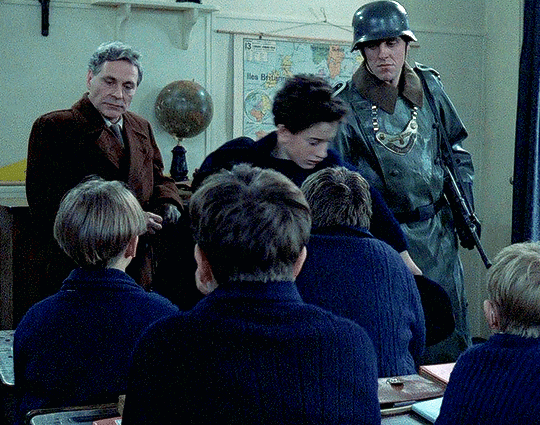
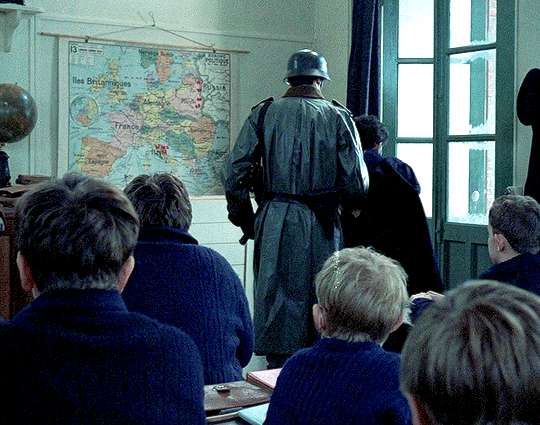
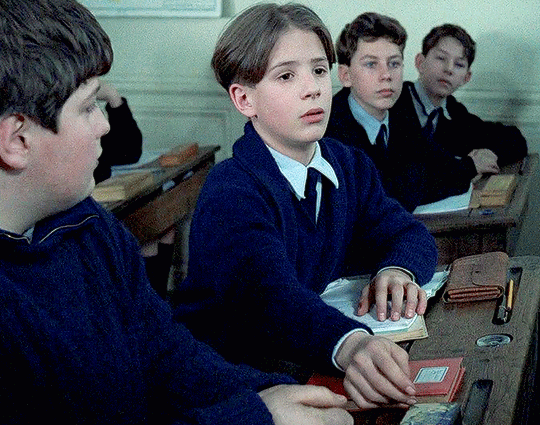
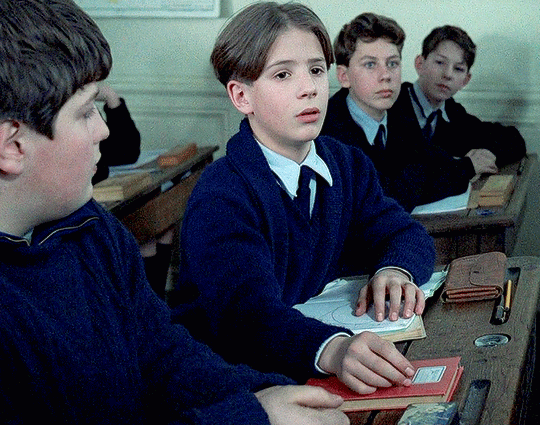
AU REVOIR LES ENFANTS (1987)
dir. Louis Malle
#au revoir les enfants#malle#mine#mine:film#mine:malle#op#filmedit#userarkady#filmgifs#moviegifs#cinemasource#cinematv#cinemapix#dailyflicks#periodedit#perioddramaedit#weloveperioddrama#dailyworldcinema
264 notes
·
View notes
Text

Au Revoir les Enfants (1987). A French boarding school run by priests seems to be a haven from World War II until a new student arrives. Occupying the next bed in the dormitory to the top student in his class, the two young boys begin to form a bond.
Devastating on so many levels. This just works, somehow avoiding scenes of overt sentimentality or violence, let leaving you feeling the aching reality of both. Incredible performances from the young cast, lush cinematography, and a script that somehow manages to feel both sprawling and entirely focused. Pretty close to perfect, really. 9/10.
#au revoir les enfants#1987#Oscars 60#nom: original screenplay#nom: foreign language film#louis malle#gaspard manesse#raphael fejto#francine racette#world war ii#france#french#anti-semitism#coming of age#9/10
8 notes
·
View notes
Text

Au revoir les enfants (1987) // Goodbye, Children
7 notes
·
View notes
Text

Au Revoir les Enfants (1987)
9 notes
·
View notes
Text
“T'as peur?
Tout le temps.”
Au Revoir les Enfants (1987).
Directed by Louis Malle.

Gaspard Manesse - Raphael Fejtö
2 notes
·
View notes
Text

Empire of the Sun was described as follow:
It's about civilian POWs in Japan, a topic that doesn't get discussed too often.
Au revoir les enfants was described as follow:
takes place at a boys school in france during ww2 where a boy named jean just started going. his classmate finds out that jean is actually jewish and he’s here under a fake name to hide from the nazis
9 notes
·
View notes
Text
so we all know this when you're watching something and you go "oh wait, this character's kinda hot/cool/whatever" and later on it turns out they're some kind of serial killer or something, right?? well, I've had it WAY WORSE
so, we watched this movie called au revoir les enfants in french class recently. here's a quick overview of the plot in case you dont know the movie: so the story takes place during ww2 in france at a christian school.there's this new student called Jean Bonnet and he quicky becomes an outcast with his peers but he makes friends with the protagonist, Julien Quentin. Turns out that his real name is Jean Kippelstein and he's jewish and hiding from the nazis. then, at the end of the movie, the gestapo comes and theyre like "yeah we heard that this school is hiding jews and we've coe to get them". there's three or something jewish children in total and they all get taken away alongside the director of the school (who took in the children despite knowing about their religion) and they all die.
okay, sad story, i know but there was this dude called joseph who helps at the kitchen and the first thime i saw him i was just like "I mean, I'm not into men but this guy's kinda...yk" and later on it turns out that he's the one who told the gestapo that the school was hiding jewish kids. pretty bad, right? WELL, IT GETS EVEN WORSE. The movie is based on an actual, real story meaning that Joseph was an actual, real person who got other actual, real people killed.
#WORSE TIMES THREE I'm german#uh oh#i still dont know how to tag#au revoir les enfants#louis malle#i hate myself
2 notes
·
View notes
Photo

Raphael Fejtö and Gaspard Manesse in Au Revoir les Enfants (Louis Malle, 1987)
Cast: Gaspard Manesse, Raphael Fejtö, Francine Racette, Stanislas Carré de Malberg, Philippe Morier-Genoud, François Berléand, François Négret, Peter Fitz, Pascal Rivet, Benoît Henriet, Richard Leboeuf. Screenplay: Louis Malle. Cinematography: Renato Berta. Production design: Willy Holt. Film editing: Emmanuelle Castro.
Père Jacques was honored at Yad Vashem in 1985 as one of the "Righteous Among the Nations" for his efforts to hide Jewish boys from the Nazis by enrolling them under pseudonyms at the Petit-Collège d'Avon, the school of which he was headmaster. Ordinarily, his heroism would make him the central figure of a film, the way Oskar Schindler became the subject of Schindler's List (Steven Spielberg, 1993). But Louis Malle was a pupil at Père Jacques's school in 1944 when the Gestapo arrested the priest and the boys he was hiding, so he tells the story from the point of view of Julien Quentin (Gaspard Manesse), a student at Malle's fictionalized version of the school. Père Jacques has been renamed Père Jean (Philippe Morier-Genoud) and moved to the periphery of the film's action, although his work in saving the boys remains, and he has one great moment at the heart of the film when, before an assembly that include the well-to-do parents of his students, he preaches a sermon excoriating the rich for their complacency and indifference. One man walks out indignantly. The film centers on Julien's sometimes rocky friendship with Jean Bonnet (Raphael Fejtö), whose real name is Kippelstein, as Julien discovers, snooping in the boy's locker. Julien makes a highly effective protagonist for Malle, who draws from his own experiences -- his pre-adolescent naïveté, his occasional sneakiness, perhaps even his bed-wetting -- to introduce a note of actuality that undercuts the sentimentality into which a story that primarily focused on the priest's heroism could descend. It enables us to see Bonnet, as he adapts to being the new boy, the outsider in more ways than one, at the school less as a victim than as a human being. Malle's steadfast insistence on portraying complex human beings gives the film a strength that a more simplistic treatment of the events would lack. He even humanizes film's potential villain, the kitchen boy Joseph (François Négret), who, after he is fired for stealing from the larder and selling the goods on the black market, turns in Père Jean and the Jewish boys he is hiding. Lame and therefore limited in his survival opportunities, Joseph sees aiding the Nazis as his only out. "C'est la guerre," he tells Julien when they encounter each other, "There's a war going on, kid!" Julien, who has been aiding Joseph by passing along some of the food his mother sends him, recognizes his own complicity.
9 notes
·
View notes
Photo

10 notes
·
View notes
Text

I re-watched 'Au revoir les enfants'. 😭 So beautiful.
1 note
·
View note
Text

East German film poster for Au revoir les enfants (1987) dir. Louis Malle, released 1988. Art by Otto Kummert.
16 notes
·
View notes
Text
There are a number of embarrassing incidents I've gone through throughout my 18 years of living. Most of them are usually not enough to keep me up at night; however, I'll never live down being told to transition by three different people.
#this all happened when my self esteem was at its weakest btw. apparently everyone thought i was a boy posing as a girl.#6th grade was a turbulent time period#anyways. i'm re-watching au revoir les enfants for the hundredth time and it really never gets old#my cat isn't a big fan though. she likes more action oriented stuff#zelma who?!
4 notes
·
View notes
Text
Au revoir là-haut, Pierre Lemaitre
Obtenir le Prix Goncourt est un privilège incontestable pour tout écrivain, qui voit son art exposé en pleine lumière médiatique. Mais on peut aussi considérer que ce prix est le parfait représentant d’un snobisme littéraire d’un milieu parisien, et qu’on a aucune envie de participer à cette mascarade chic et en toc. D’autant plus que si on s’amuse à parcourir la liste des romans primés depuis…

View On WordPress
#1ere guerre mondiale#Au revoir là-haut#Les enfants du désastre#Littérature française#Poilus#Prix Goncourt
1 note
·
View note
Text
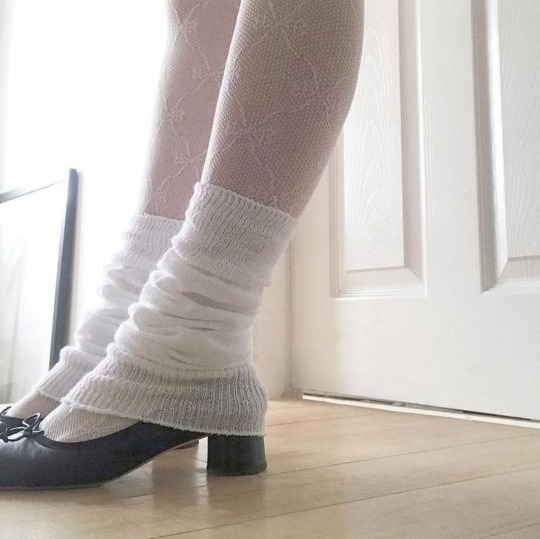


au revoir ❀˚̩̩̥͙°̩̥‧̥·̊‧̥°̩̥‧̥·̊✿ les enfants

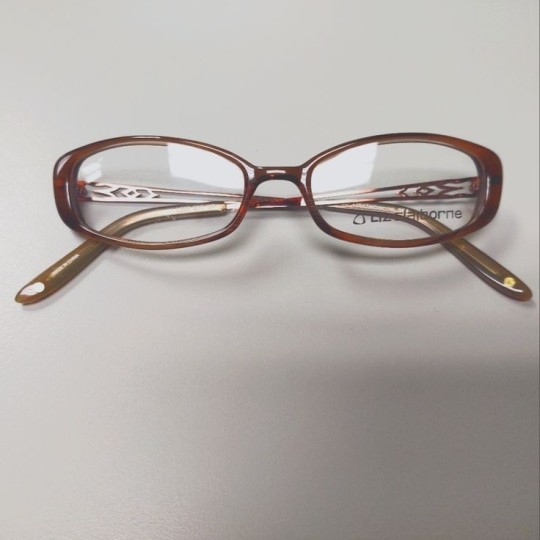





#Ⳋ᧙ ̮͡i-mmaculatus# #𓈒 𓈒 mbs 𓈒 𓈒#bio cr cisneroto#div cr pommecita#div on img cr v6que#kpop#kpop icons#kpop layouts#kpop moodboard#moodboard#messy moodboard#white moodboard#beige moodboard#grey moodboard#gray moodboard#green moodboard#cute moodboard#aesthetic moodboard#archive moodboard#pretty moodboard#loona moodboard#loossemble moodboard#vivi moodboard#vivi icons#vivi layouts#vivi loona#vivi loossemble#loona vivi#loossemble vivi
231 notes
·
View notes
Text
People around the world are translating Refaat's "If I must die" poem so it'd have a wider reach. Against Israel's wishes, Refaat will never die, his soul will live on in the words he shared and the way he touched people's hearts. Israel did nothing but cement his legacy. Remember Refaat, let his martyrdom be a symbol of hope for a Free Palestine, just like he wanted.
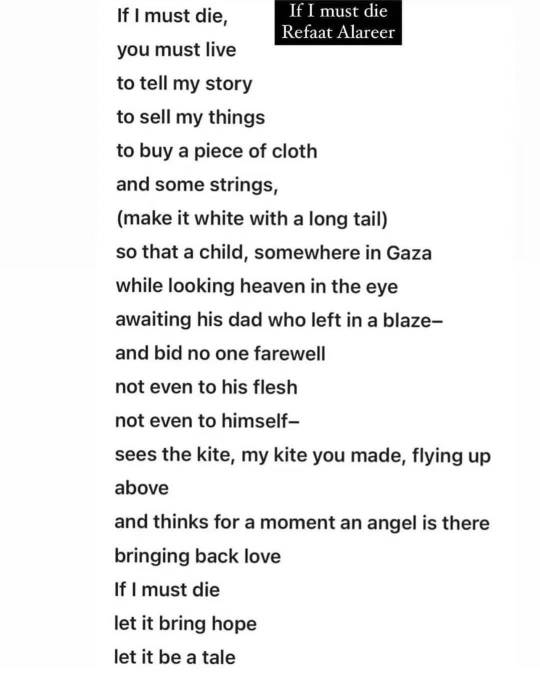
Here are some of the translations, more can be found in the twitter thread

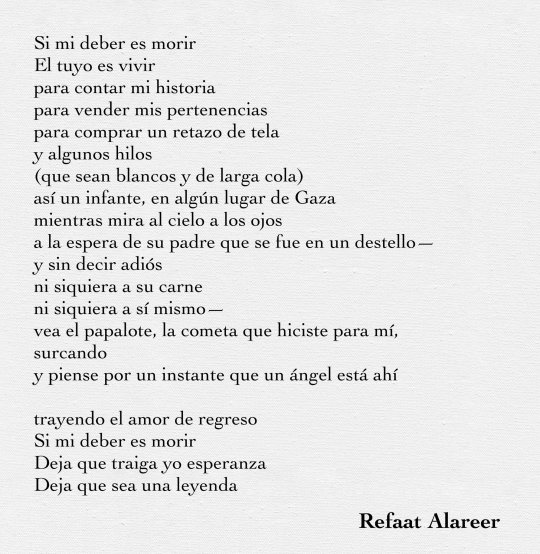



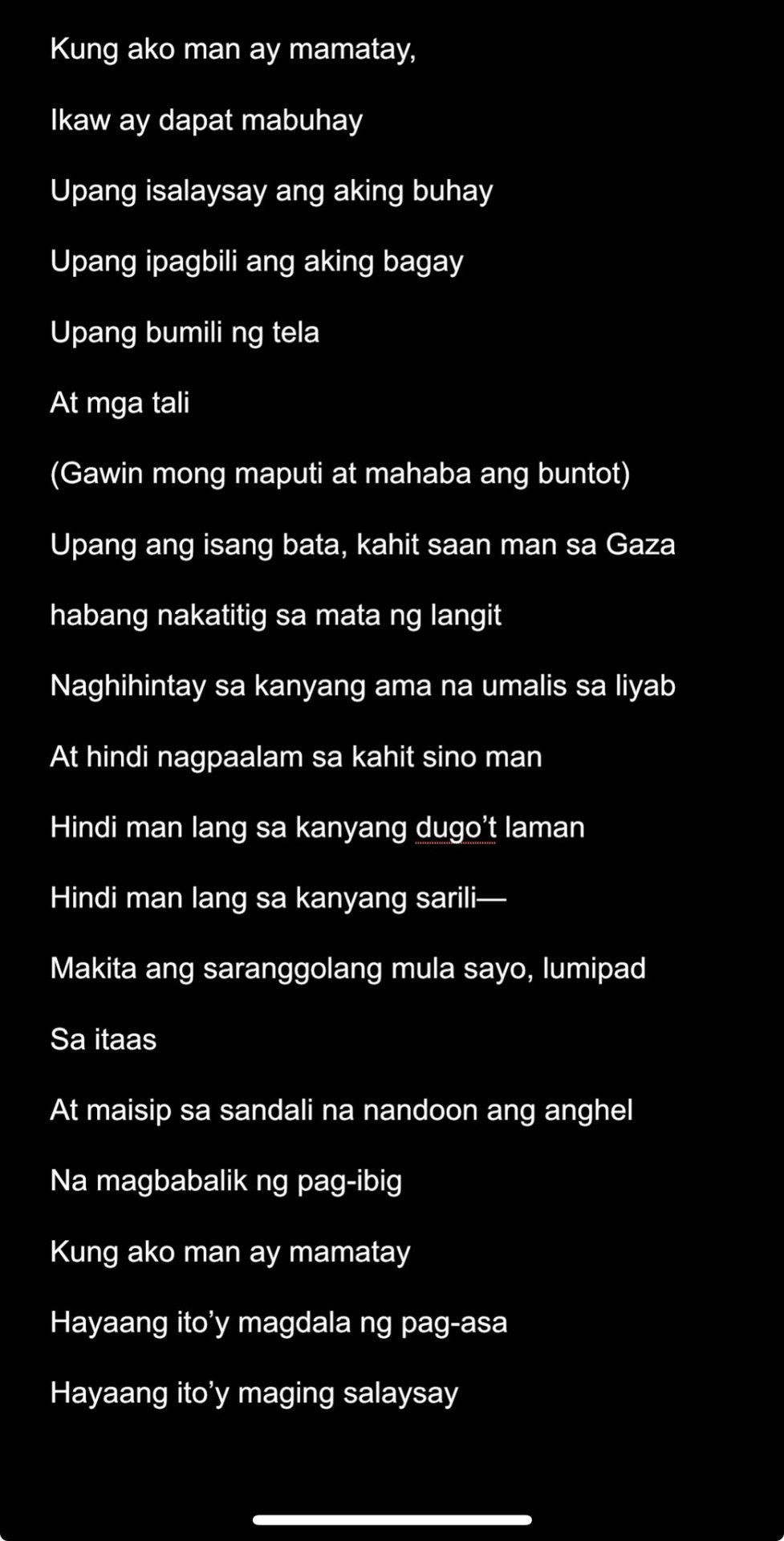

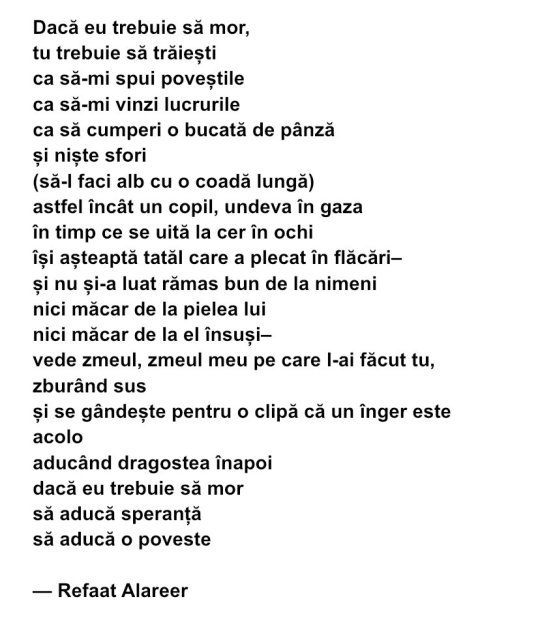
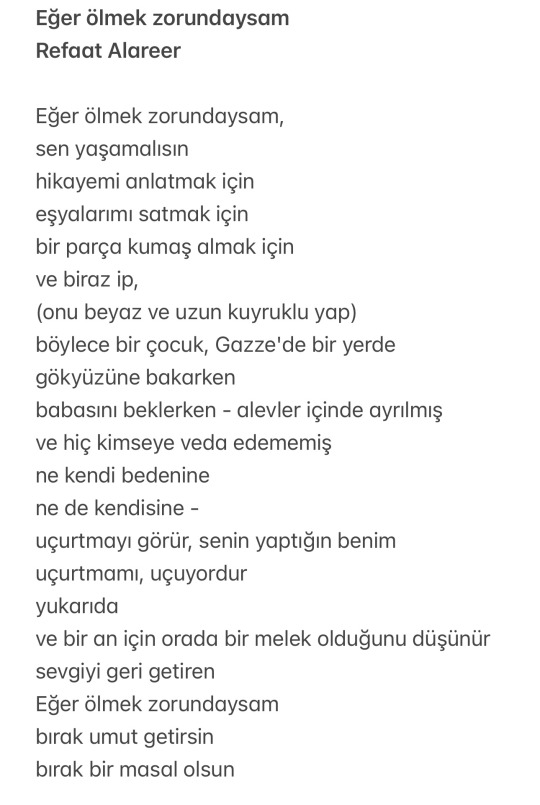
And here is my translation in French :
Si je devais mourir
Vous devez vivre pour raconter mon histoire
Pour vendre mes affaires
Pour acheter un bout de tissu
Et quelques fils
(faites qu'ils soient blanc et long)
Pour qu'un enfant, quelque part à Gaza
En regardant le Paradis dans les yeux
Attendant le retour de son père parti dans une explosion
Sans dire au revoir à personne
Même pas à sa chair
Même pas à lui-même-
Voit le cerf-volant, mon cerf-volant que tu as préparé, volant dans l'au-delà
Pour qu'il pense pour un instant qu'un ange est là
Ramenant avec lui l'amour
Si je devais mourir
Faites que ca insuffle de l'espoir
Faites que ca devienne une histoire
And Arabic, his mother tongue :
إذا كان لا بد لي أن أموت
يجب عليك العيش
لتحكي قصتي
لتبيع أغراضي
لتشتري قطعة من القماش
والقليل من الخيط،
(ليكن أبيضا وذا ذيل طويل)
لطفل في مكان ما بغزة
يرى الجنة امام عينيه
ينتظر أباه الذي ذهب في إنفجار
ولم يودع أحدا
ولا لحمه
ولا نفسه
لكي يرى الطائرة الورقية، طائرتي التي صنعتها، تحلق عاليا
ويظن لوهلة أن ملاكا ما قد أتى
ومعه الحب
إذا كان لا بد لي أن أموت
فليأتي ذلك الأمل
فليصبح ذلك قصة
#free palestine#palestine#free gaza#gaza#genocide#colonialism#stop genocide#stop israel#free west bank
171 notes
·
View notes
